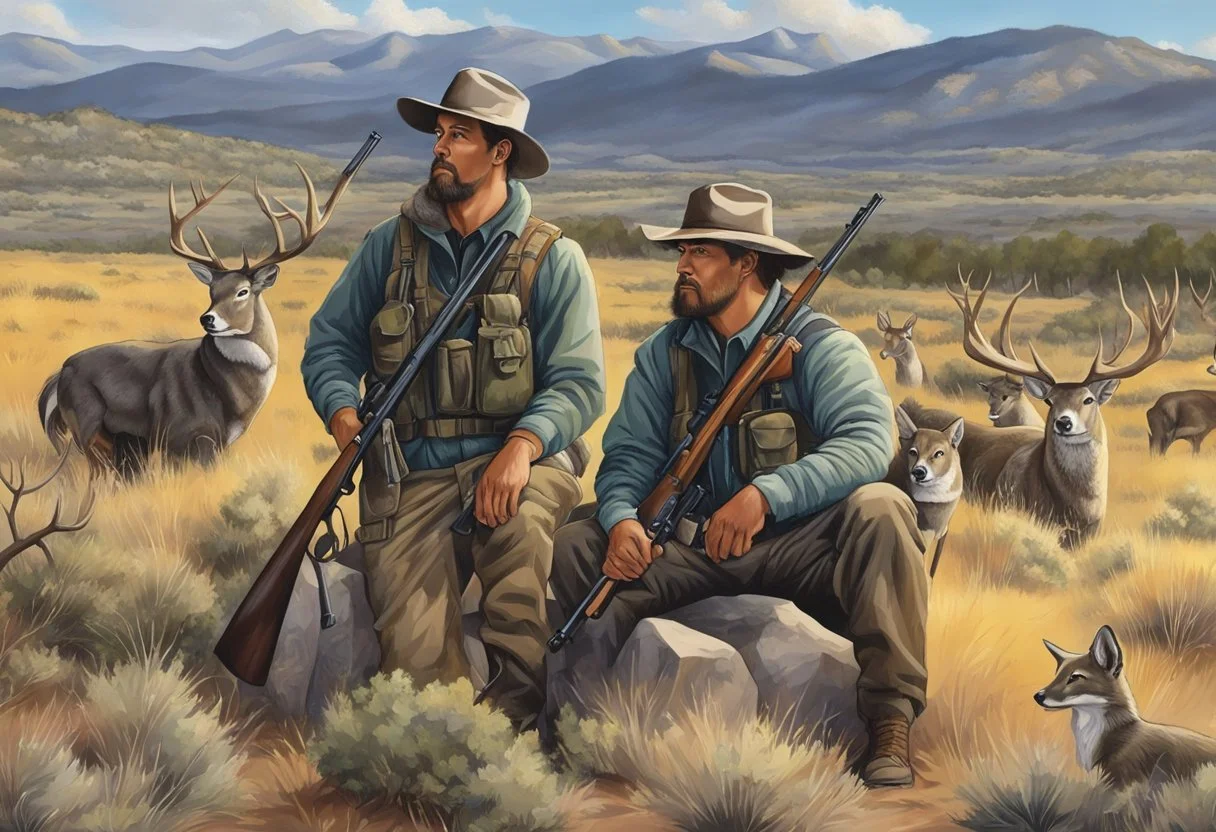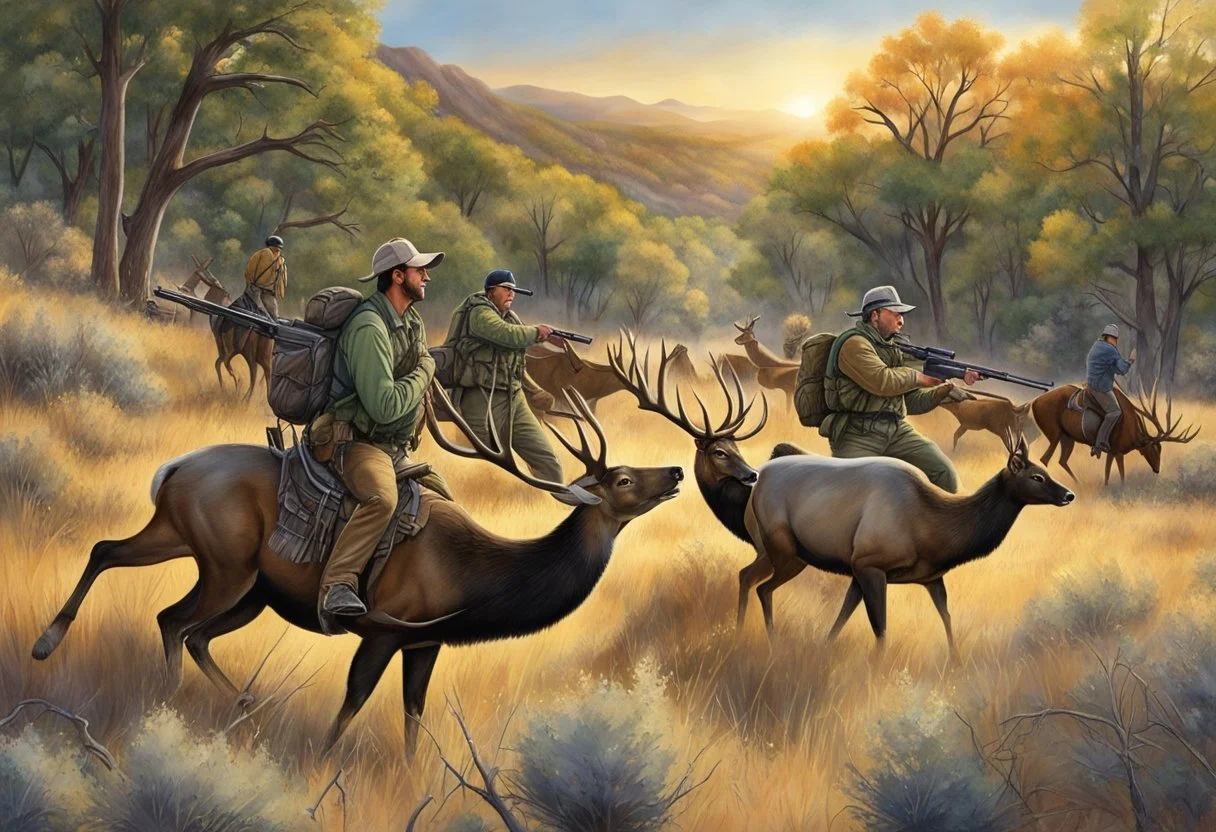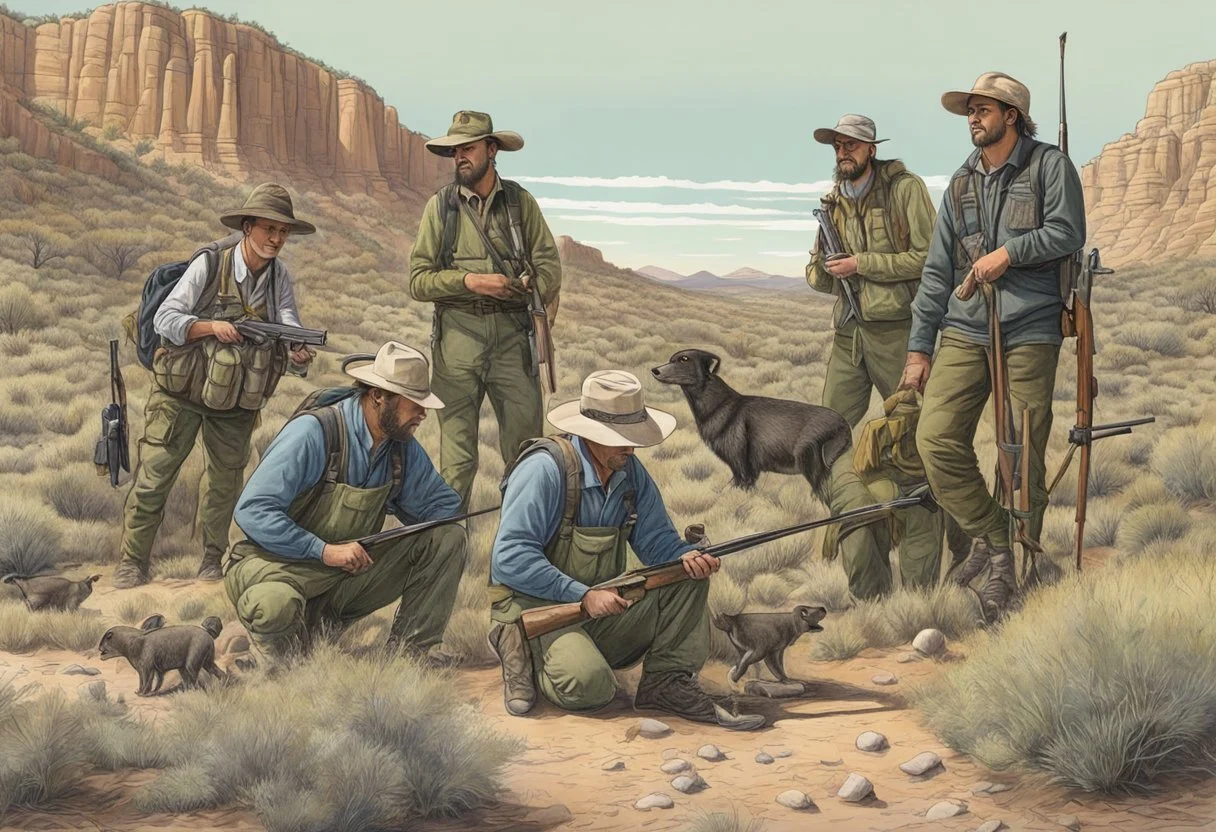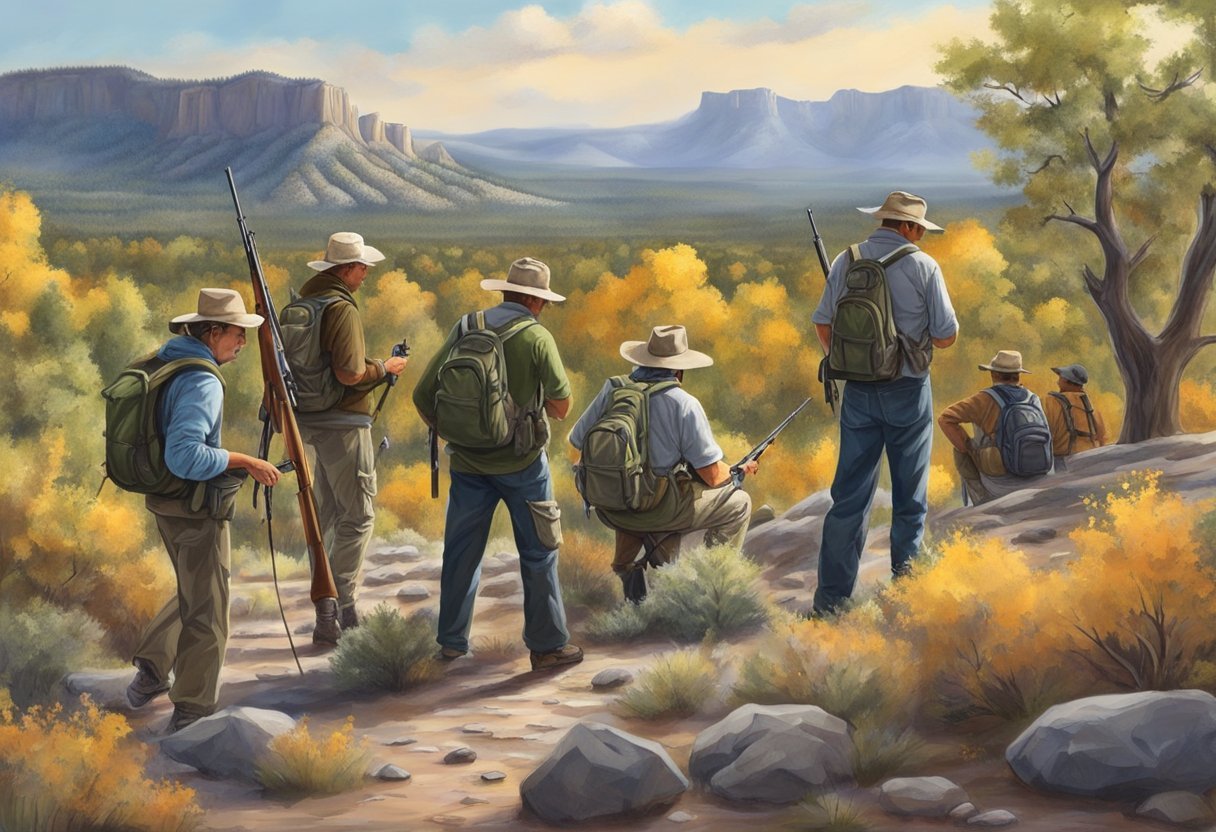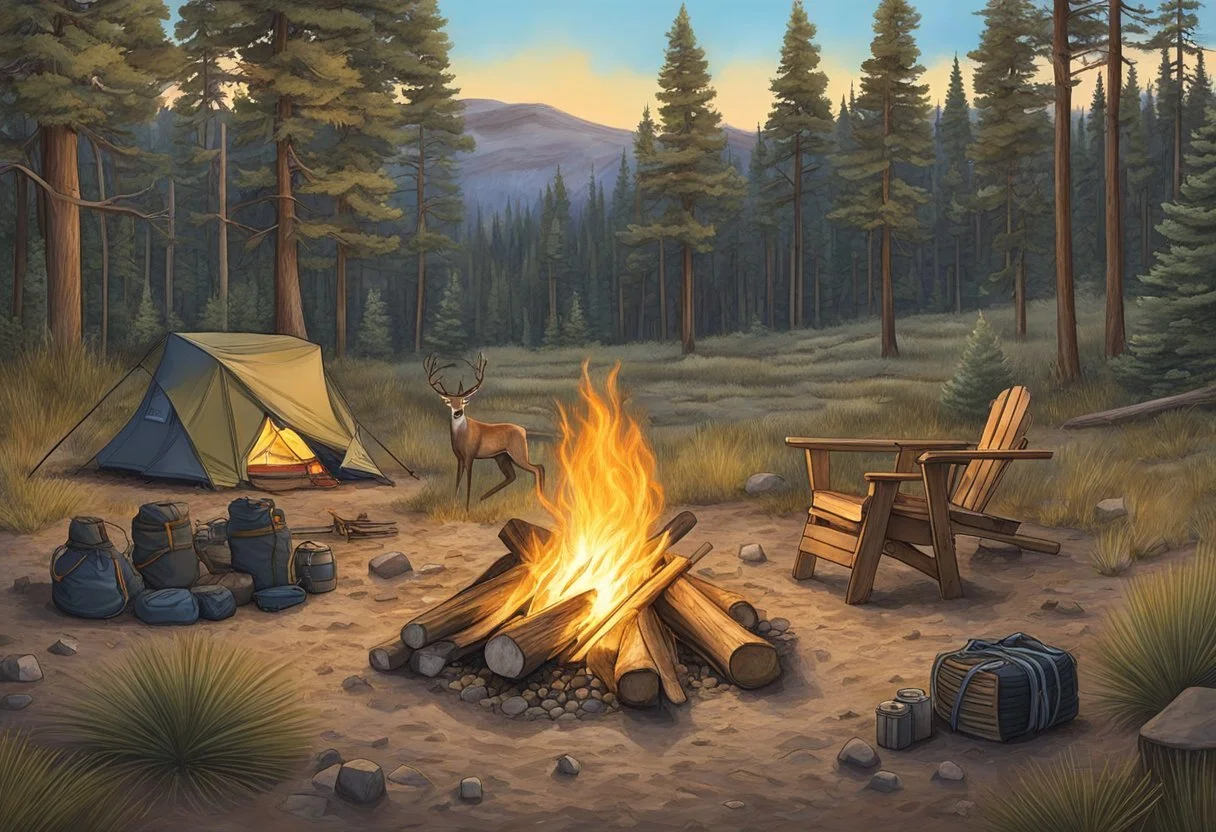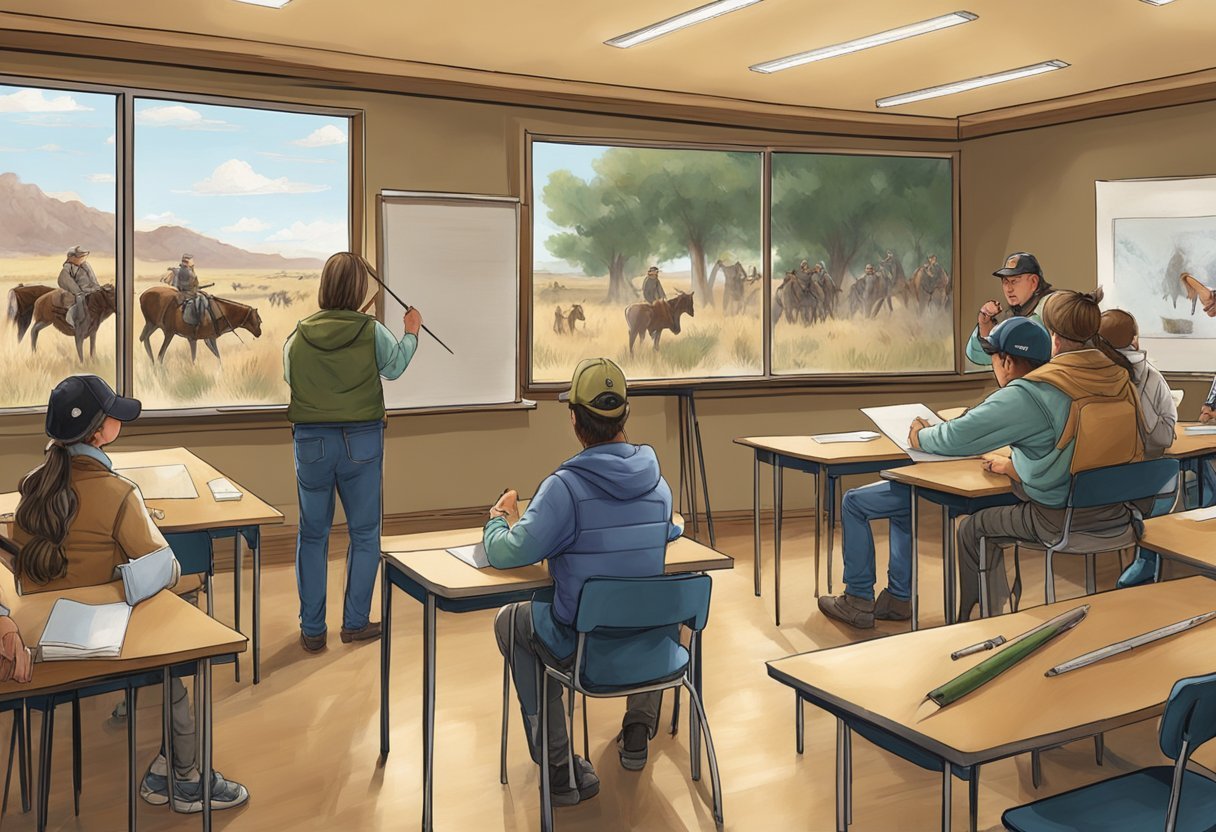Your Guide to Hunting in New Mexico
Essential Tips and Insights
This Article is Part of Our Hunting Guide for All 50 US-States
New Mexico boasts diverse landscapes and a population of numerous game species, making it an attractive destination for hunters of all skill levels. For beginners looking to embark on their first hunting adventure in the state, it's essential to familiarize yourself with the local regulations, hunting seasons, and safety protocols. With the right preparation and respect for the environment, you're on track to enjoy a fulfilling hunting experience in the Land of Enchantment.
To get started, a crucial first step for any beginner is to obtain a hunting license. This process involves completing a hunter education course, which imparts valuable information regarding ethical hunting practices, wildlife identification, and firearm safety. Moreover, New Mexico has specific permits and stamps requirements depending on the game you intend to hunt, so be sure to familiarize yourself with these details before setting out on your excursion.
Acquiring a solid understanding of the hunting environment in New Mexico is necessary to ensure a successful experience. The state features an assortment of game animals such as deer, elk, pronghorn, and waterfowl, each with their unique habitats and behavior patterns. Researching these species and their preferred environments can help you identify ideal hunting locations and prime hunting seasons, thus maximizing your likelihood of bagging game as a beginner hunter.
Understanding Hunting in New Mexico
Wildlife Conservation and Management
In New Mexico, wildlife conservation plays a significant role in maintaining the state's diverse and unique ecosystems. The New Mexico Department of Game and Fish (NMDGF) is responsible for managing and conserving wildlife resources to ensure long-term population sustainability. The department sets hunting season dates, bag limits, and permit quotas based on scientific research and population studies for each species.
In addition to conserving game species, NMDGF also aims to protect non-game species and their habitats. Hunters can contribute to these conservation efforts by adhering to regulations and participating in voluntary programs such as:
Hunter Education Courses
Habitat Improvement Volunteering
Report Wildlife Violations
State Wildlife Action Plan
The State Wildlife Action Plan (SWAP) is New Mexico's strategic plan for conserving wildlife and their habitats. This comprehensive plan identifies priority species and habitats in need of conservation efforts, and establishes strategies on how to best address these conservation priorities. SWAP serves as a guide for partners, stakeholders, and the NMDGF on effective and collaborative conservation actions. The plan focuses on three primary approaches:
Species and Habitat Assessments
Conservation Strategies
Monitoring & Adaptive Management
Hunters can support the goals of SWAP by becoming knowledgeable about the priority species and habitats, respecting the land and wildlife, and by participating in conservation actions.
Population Management
Population management in New Mexico is essential to maintain healthy and sustainable wildlife populations for the enjoyment of all citizens, including hunters. The NMDGF uses various management strategies to accomplish this goal:
Hunting regulations: Restrictions on season dates, hunting methods, and bag limits help control population numbers, while maintaining a balance between hunting opportunities and conservation goals.
Habitat improvement: Restoring degraded habitats, protecting crucial areas, and coordinating with land managers encourage healthy populations and prevent over-population related issues.
Reintroduction efforts: For species that have experienced significant declines or extirpation, NMDGF works to reintroduce individuals to suitable habitats, ensuring the long-term viability of these populations.
Remember that as a responsible hunter, understanding and respecting New Mexico's wildlife conservation and population management efforts is crucial for the preservation of the state's natural resources for future generations to enjoy.
Legal Requirements for Hunters
When planning a hunting trip in New Mexico, it's vital for beginners to understand the legal requirements. In this section, we'll cover the necessary licenses, permits, and education course.
Hunting Licenses
To hunt in New Mexico, all residents and non-residents must possess a valid hunting license. The types of licenses available include:
Standard Resident: For New Mexico residents
Standard Non-Resident: For those living outside of New Mexico
Youth: For hunters aged 17 and under
Senior: For hunters aged 65 or older and residents of New Mexico
Disabled: For disabled hunters who meet the necessary criteria
It's important to note that licenses must be visibly displayed while hunting.
Permits and Habitat Stamps
In addition to a hunting license, some hunts require specific permits. For big game hunting (e.g., deer, elk, bear, turkey, etc.), hunters must first apply for and obtain a permit through a lottery system known as The Big Game Draw. Once the permit is granted, the applicant must purchase the corresponding big game hunting license.
Besides permits, you may also be required to purchase a habitat stamp if hunting on Bureau of Land Management (BLM) or U.S. Forest Service (USFS) lands. The habitat stamp is a conservation tool that helps fund wildlife habitat improvement projects.
Hunter Education Course
New Mexico law mandates that all hunters under the age of 18 must complete a hunter education course before obtaining a hunting license. The course covers topics like:
Hunting laws and regulations
Firearms safety
Wildlife identification
Ethical hunting practices
Courses are available in person, online, and through self-study. A Certificate of Completion is issued upon successful course completion, which must be presented when purchasing a hunting license.
By adhering to these legal requirements, beginner hunters in New Mexico can ensure a safe, enjoyable, and successful hunting experience.
Planning Your Hunt
Game Management Units (GMU)
New Mexico is divided into various Game Management Units (GMU), which are important for beginner hunters to familiarize themselves with. These units are specifically tailored for wildlife conservation and to provide ample hunting opportunities for different species. To hunt in New Mexico, you must select a GMU that aligns with your desired game and follow the regulations set for that specific unit.
There are different quotas and draw odds for each GMU. Research these odds for your desired species to increase your chances of success. Units with better draw odds might be more challenging to access, while those with harsher conditions could provide more opportunities. Be sure to thoroughly research the GMU you plan to hunt in to ensure you are prepared for the terrain and conditions.
Selecting Game and Hunting Seasons
New Mexico offers a variety of hunting opportunities, including big-game and draw hunts. As a beginner, it's essential to choose the type of game you want to hunt and familiarize yourself with the corresponding hunting seasons. The New Mexico Department of Game and Fish provides a detailed hunting guide for each species, including:
Elk
Deer
Turkey
Hunting seasons vary based on the species and weapon type (e.g., rifle, bow, or muzzleloader). Check the specific hunting regulations for your desired game to ensure you are hunting within the correct timeframe.
Accessing Hunting Lands
In New Mexico, there are different types of hunting lands, including public and private lands. Public lands, such as National Forests and Bureau of Land Management areas, are generally open to hunting. However, it's crucial to check any restrictions or special regulations before embarking on your hunt.
Private lands require permission from the landowner to access for hunting purposes. Some private lands offer hunting opportunities through the New Mexico Private Lands Use System (PLUS). These lands provide valuable hunting opportunities, especially for big-game species. To access these areas, hunters must obtain a Private Land Use Permit from the landowner or agent.
To better understand and navigate the public and private lands, it is advised to utilize maps and land-use applications from reliable sources like the New Mexico Department of Game and Fish. This will ensure you are hunting legally and responsibly.
Types of Hunts and Species
New Mexico offers a diverse range of hunting opportunities for beginners. This section will briefly discuss the main types of hunts and species available in the state.
Big-Game and Draw Hunts
In New Mexico, big-game species include animals such as bear, bison, pronghorn, mule deer, and bull elk. Draw hunts are popular among hunters aiming for these animals, as they determine the recipient of limited hunting permits through a lottery system. Notable big-game species include:
Bear: Black bears are the most common species found in the region, occupying various habitats.
Bison: While not as common, bison can be found in certain areas, such as the Valle Vidal in northern New Mexico.
Pronghorn: These agile and fast ungulates inhabit open grasslands and prairies throughout the state.
Mule Deer: Known for their large, distinctive ears, mule deer can be found in the wooded and mountainous regions.
Bull Elk: A majestic and challenging species for hunters, bull elk are abundant in the state's mountain ranges.
Waterfowl and Bird Hunts
Hunting waterfowl and bird species is another popular pursuit in New Mexico. Among these species, dove and various waterfowl stand out as some of the favorite targets for hunters. Here is a brief overview of these species:
Dove: Both mourning doves and white-winged doves can be found throughout the state, particularly in warmer months.
Waterfowl: Ducks, geese, and other waterfowl species are abundant during migratory seasons, attracting hunters to marshes, lakes, and rivers.
Other Wildlife Species
Apart from the primary species mentioned above, New Mexico offers hunting opportunities for other wildlife species, such as:
Small Game: Rabbits, squirrels, and other small game are also available for hunters seeking a less challenging hunt.
Predators: Some hunters may target predators like coyotes, foxes, or bobcats, which can be found in various habitats across the state.
Overall, New Mexico provides diverse hunting experiences, making it an ideal destination for beginners to explore and develop their skills in the field.
Licenses, Permits, and Fees
Understanding Draw Licenses and Fees
In New Mexico, draw licenses are required for hunters wanting to take part in specific hunts. Draw licenses work on a lottery system, where applicants are randomly selected to participate. These licenses are different from the standard hunting licenses and come with specific fees.
The cost of draw licenses varies depending on the type of hunt, the species being hunted, and the applicant's residency status. Here's a general breakdown of the fees:
Resident Non-resident Standard Draw License $30 - $65 $270 - $780 Quality or High-Demand Draw License $90 - $125 $555 - $1,560
It's important to note that these fees are in addition to the regular hunting license fee, which ranges from $15 to $65 for residents and $65 to $550 for non-residents. Also, youth and senior hunters can benefit from discounted rates.
Special Use Permits
In addition to draw licenses, special use permits are required for certain hunting activities in New Mexico. These permits are meant to cover unique situations, such as hunting on private land or participating in specialized hunts. Some of the most common special use permits include:
Private Land-Only Licenses: These licenses are essential for hunters who plan to hunt exclusively on private property. Fees for these permits range from $70 to $290 for residents and $290 to $2,250 for non-residents.
Disabled Hunter Permits: New Mexico offers special permits for hunters with disabilities, granting them access to hunt using alternative methods and equipment. To qualify, hunters must have a valid disability certification.
Depredation Hunts: Hunters participating in depredation hunts will need a special permit, which focuses on controlling damage caused by certain wildlife species. There are no fees associated with depredation hunt permits, but the number of permits issued is limited.
It is crucial for hunters to understand that acquiring proper licenses, permits, and paying the required fees is not only a matter of legality but also a way to support conservation efforts in New Mexico. By adhering to these regulations, hunters can confidently enjoy their sport and contribute to preserving the state's natural resources.
Conservation Efforts and Participation
Share With Wildlife Program
Share With Wildlife is a New Mexico program aimed at supporting wildlife research, education, and rehabilitation projects. The program is funded by voluntary contributions from the public, including those made by hunters. Additionally, hunters can purchase the Share with Wildlife License Plate to further support these initiatives. Through this program, hunters in New Mexico play an active role in wildlife management and conservation.
Habitat Information
In New Mexico, it is vital for beginners to understand the importance of conserving wildlife habitats. Habitat Information is an essential component when planning hunting trips, as it includes understanding the various native species and ecosystems in the state. The New Mexico Department of Game and Fish provides useful resources for hunters to learn about local habitats, sensitive areas, and protected species. By familiarizing themselves with these crucial aspects, beginners can make more informed decisions and contribute to conservation efforts while hunting.
Wildlife Violators and Penalties
To protect New Mexico’s wildlife and promote responsible hunting, the state enforces strict regulations and penalties for Wildlife Violators. Some common violations include:
Hunting without a valid license or permit
Taking a protected species
Hunting in closed areas or during prohibited times
Violators are subject to fines, confiscation of equipment, and possible license suspension. It is crucial for beginner hunters to familiarize themselves with these regulations and penalties to practice safe and ethical hunting. Reporting any observed violations to the Operation Game Thief hotline is another way to actively participate in wildlife conservation efforts in New Mexico.
Hunting Equipment and Preparation
Choosing the Right Gear
When embarking on a hunting adventure in New Mexico, appropriate gear is essential for a successful and enjoyable experience. First-time hunters must prioritize the following items:
Clothing: Dress in layers to accommodate various weather conditions. Opt for camouflage or neutral-colored clothing, and don't forget gloves, hats, and waterproof boots.
Backpack: A durable, spacious backpack is necessary to carry equipment, food, water, and any harvested game.
Navigation: Equip yourself with a GPS device or a reliable map and compass for easy navigation through unfamiliar terrains.
First-aid kit: Accidents can happen; be prepared with a well-stocked first-aid kit.
Optics: Quality binoculars or scopes help in spotting game from a distance.
Firearm and Bow Hunting Considerations
Hunters in New Mexico have the option to choose between firearm and bow hunting. Before deciding, novices should visit local shooting ranges to familiarize themselves with various weaponry types. Practice and comfort with equipment are crucial to a successful hunt. Here are some considerations for each method:
Firearms
Appropriate caliber: Choose a caliber that suits the intended game. For instance, a .30-06 or .308 is suitable for deer and elk, while smaller calibers like .243 or .223 are better for varmints and small game.
Sighting-in: Ensure your rifle is sighted-in and consistently accurate before heading outdoors.
Ammunition: Carry the correct and sufficient ammunition quantity for your hunting trip.
Draw weight: Select a bow with a comfortable draw weight that adheres to New Mexico's regulations, which stipulate a minimum of 40 pounds for hunting deer and elk.
Arrows and broadheads: Use high-quality arrows and broadheads designed for hunting to ensure a quick, ethical kill.
Practice: Regularly practice at an archery range to build strength and develop precise shooting skills.
In summary, investing time and effort in equipment preparation and practice with chosen hunting tools ensures a safe and rewarding hunting experience in New Mexico.
Responsible Hunting Practices
Ethical Hunting
Abiding by hunting regulations is a crucial part of ethical hunting. New Mexico has specific rules and regulations in place for various game species, which can be found on the New Mexico Game and Fish website. Some essential practices include:
Hunting only during designated seasons.
Acquiring the necessary hunting licenses and permits.
Properly identifying your target before taking a shot.
Respecting private property and only hunting on public lands or with landowner permission.
Additionally, always strive to minimize the suffering of game animals by:
Practicing your marksmanship to ensure clean and humane shots.
Following up on any wounded animals promptly to minimize suffering.
Using appropriate caliber firearms or archery equipment for the game species being hunted.
Safety and First Aid
Safety should be every hunter's top priority. When hunting in New Mexico, follow these fundamental guidelines to ensure a secure experience for yourself and others:
Always treat every firearm as if it's loaded, and maintain proper muzzle control.
Wear appropriate safety gear, such as reflective clothing to make yourself visible to other hunters.
Never hunt under the influence of drugs or alcohol.
Inform someone before heading out, including your planned location and estimated return time.
First aid knowledge is vital, so you're prepared for potential emergencies. Carry a well-stocked first aid kit and consider taking a first aid course. Some essential items for a hunting first aid kit include:
Item Use Bandages Treating cuts, scrapes, and punctures Gauze pads Covering wounds Medical tape Securing dressings Antiseptic wipes Cleaning wounds Tweezers Removing splinters, ticks, and debris Pain relievers Managing pain and inflammation
Dealing with Aquatic Invasive Species
Aquatic invasive species can have a significant impact on New Mexico's ecosystems and economy. Hunters play an essential role in preventing their spread.
When using an off-highway vehicle (OHV) near water bodies, make sure to:
Clean and inspect your OHV, including tire treads, for any visible debris or organisms.
Drain any standing water from your equipment, including cooling systems, before leaving the area.
Dry your equipment thoroughly before using it in another water body to prevent the transfer of invasive species.
By following these responsible hunting practices, beginners can ensure a safe, ethical, and enjoyable hunting experience in New Mexico.
Supplementary Hunting Opportunities
In addition to hunting in New Mexico, beginners can also take advantage of other types of recreational activities, such as fishing. This section briefly covers the options for obtaining fishing and combined licenses.
Fishing and Combined Licenses
If you're interested in expanding your outdoor pursuits beyond hunting, consider fishing! New Mexico offers a variety of fishing opportunities, with numerous lakes, rivers, and streams teeming with a diverse range of fish species, such as trout, bass, and catfish.
To get started with fishing in New Mexico, you'll need a fishing license. Licenses can be obtained through several methods:
Online: Visit the New Mexico Department of Game and Fish website to purchase your license.
In-person: Authorized retail vendors, such as sporting goods stores and marinas, offer licenses for purchase.
Telephone: Call the New Mexico Department of Game and Fish to request a license.
For beginners interested in both hunting and fishing, there are options for combined licenses, which provide the privilege to participate in both activities. Here's a quick overview of the combined licenses available:
License Type Eligibility Duration Resident Combo New Mexico Residents Annual Non-Resident Combo Out-of-State Visitors Annual
Resident Combo licenses are for New Mexico residents and offer an affordable way to enjoy both hunting and fishing within the state year-round. On the other hand, Non-Resident Combo licenses provide the same privileges to out-of-state visitors who want to partake in these recreational activities during their stay in New Mexico.
Remember, it is crucial to familiarize yourself with the state's laws and regulations surrounding hunting and fishing. Visit the New Mexico Department of Game and Fish website or consult local resources for specific rules and guidelines when venturing out on your adventures.
Post-Hunting Activities
Game Processing
After a successful hunt, proper game processing is essential in order to preserve the quality of the meat or prepare it for taxidermy. It's important to:
Field dress the animal: This involves removing the internal organs as soon as possible to prevent spoilage.
Skin and quarter the animal: After field dressing, the hide should be removed and the carcass should be quartered if necessary.
Cool and store the meat: Be sure to cool the meat as quickly as possible in order to prevent bacterial growth. Store it in a cooler or ice chest while transporting it home.
For beginners, it's helpful to bring a game processing guide or seek assistance from a more experienced hunter to ensure proper handling of the harvested animal.
Trophy and Meat Sharing
In New Mexico, many hunters enjoy sharing their trophy and the meat they harvest with friends, family, and sometimes charitable organizations. Here are some tips for trophy and meat sharing:
Meat donation: Many hunters donate portions of their harvest to organizations that help feed those in need. To locate a donation program, contact your local New Mexico Department of Game and Fish office or visit their website.
Trophy display: It's common for hunters to display their trophies, such as antlers, in their homes. Make sure the trophy is properly cleaned and treated to prevent damage or decay.
Preparing a meal: Sharing a meal with friends and family is a great way to enjoy the fruits of your labor. Before cooking, research the appropriate preparation techniques for the specific game to ensure a tasty meal.
Remember to follow all local laws and regulations regarding the transport, processing, and sharing of game within New Mexico. Happy hunting!
Continuing Education in Hunting
Further Education Materials
A variety of educational materials are available to enhance the hunting skills of beginners in New Mexico. Books, magazines, and online articles provide valuable insight into different hunting techniques, equipment, and best practices. Some notable options include the Hunter's Handbook and Outdoor Life magazine. Additionally, online forums like Hunt Talk offer a platform for hunters to share experiences, tips, and advice.
For those looking to improve their hunting skills further, consider enrolling in advanced courses offered by organizations such as the National Rifle Association (NRA) or local hunting clubs. These courses provide hands-on training, focusing on aspects such as marksmanship, game tracking, and field dressing.
State Game Commission Lands and Resources
New Mexico's State Game Commission manages extensive lands and resources, providing ample opportunities for hunting. State Game Commission lands offer access to a wide variety of game species, while their resources aid hunters in understanding regulations and best practices. Key resources provided by the commission include:
Maps: Detailed maps show the boundaries and access points of various hunting units and areas.
Harvest Reports: These offer information on past hunting seasons, helping hunters to strategize and plan for future hunts.
Publications: The commission publishes a range of informative materials, from species-specific brochures to seasonal hunting guides.
Additionally, the State Game Commission ensures that hunters follow strict regulations to maintain a healthy game population and ecosystem. Compliance with hunting laws demonstrates a commitment to responsible hunting practices.
In conclusion, continuing education in hunting provides an excellent foundation for beginners looking to embark on a successful and responsible hunting journey in New Mexico. Utilizing the offerings from both further education materials and the State Game Commission lands and resources equips new hunters with valuable knowledge and guidelines to follow.


